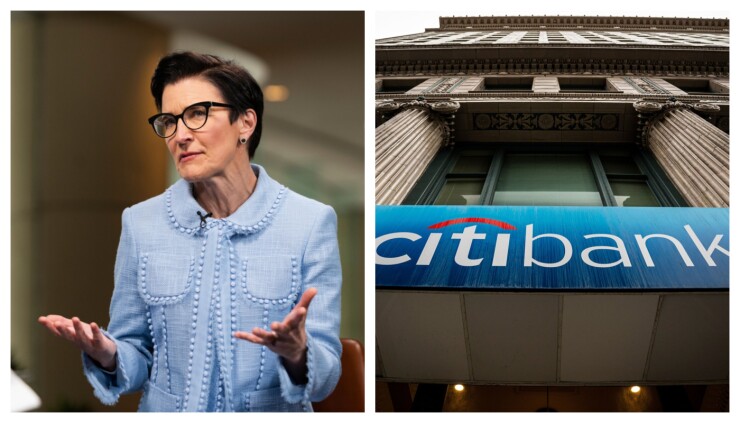
UPDATE: This article includes comments made during Citi's earnings call.
So that means operating expenses remain elevated, at least temporarily, Fraser told analysts during the bank's fourth-quarter earnings call. And while costs should decline after this year — executives said less than $53 billion annually is the goal — the current higher-than-desired expenses are a big reason for the company's decision to revise a profitability gauge for 2026.
"As CEO, I will not sacrifice the right long-term investments in our growth and competitiveness for short-term expediency," Fraser said on the call. The revised ROTCE forecast "is a way point. It's not a destination. And we know what we need to do. We've got our arms around all of this."
Earlier in the call, she said that she "could have taken a short-term decision" to reduce certain investments. But "I'm just not going to do that. You shouldn't want me to do that," she said.
Fraser, who is about to enter her
Still working on the overhaul
Challenges remain. It's still revamping and upgrading its risk management compliance and internal controls systems, which have caused numerous blunders and resulted in various regulatory actions over the years. Last summer, the Federal Reserve and the Office of the Comptroller of the Currency ordered
On Wednesday's call, Fraser was adamant that the company is moving in the right direction. The ultimate goal is to improve financial performance and revive its long-lagging stock price.
The revised ROTCE forecast for 2026 is still better than some analysts' expectations. Saul Martinez, an analyst at HSBC, said in a research note Wednesday that he's calling for 9.8%.
Meanwhile,
"Our intention is to continue to improve returns well above" the revised ROTCE target for 2026, Fraser said. "And we are accountable for doing so. We are relentless in our determination to run the bank more efficiently, fulfill
Betsy Graseck, an analyst at Morgan Stanley, pressed Fraser to explain why
It did not provide guidance on when it plans to conduct additional repurchases.
Part of the reason for not making a bigger push is that the industry is waiting to see what capital rules get implemented. While the proposed Basel III endgame rules were largely watered down last year and could see further changes with President-elect Donald Trump at the helm, some banks are still exercising caution when it comes to capital-related decisions.
"In terms of timing, like our peers, we're not committing to a particular time frame for this," Fraser said. "But you can see our commitment. You can hear our commitment."
Net income rose on higher revenues
During the fourth quarter,
For the full year,
Banking regulators hit companies with penalties for poor interest-rate risk, third-party management, anti-money-laundering controls and consumer protection, among other violations.
Earnings per share totaled $1.34 for the quarter, up from a loss of $1.16 from the year-ago period. Analysts polled by S&P Capital IQ had expected earnings per share of $1.22.
During 2024,
The company expects 2025 revenues of $83.5 billion to $84.5 billion. Expenses, meanwhile, are expected to be "slightly lower" than $53.8 billion,
The company did not put a hard number on anticipated ROTCE this year, saying only that it is projected to be higher than the 7% recorded for 2024.
Cutting retail divisions overseas
In recent months,
Of the 14 markets,






